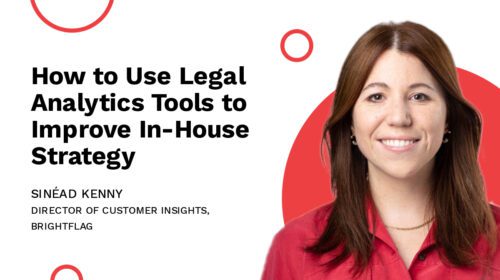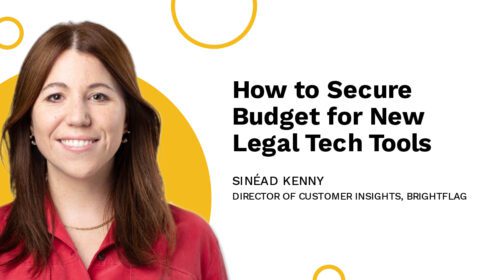How Legal Can Collect and Report the Data That Finance Needs
Stephanie Lamoureaux is a seasoned expert when it comes to navigating common issues faced by legal operations professionals. She has spent most of her career building out legal ops functions at global brands like Gap, Twitter, Block, and—currently—Live Nation. And she has done so with a heavy focus on improving the processes surrounding how legal teams manage their finances, and how they collect and report financial data.
During a recent Brightflag webinar, I spoke with Stephanie about how legal teams can further develop their financial acumen to build stronger connections with the finance department and the CFO. Here were a few key pieces of advice that she shared.
Get Familiarized with Key Stakeholders in Finance
Having in-depth, up-to-date reporting on legal spend is obviously one of the keys to a successful partnership with finance. But knowing how and when to share that data requires open lines of communication.
To establish that familiarity and trust, you’ll need to sit down with the key stakeholders within finance to get a lay of the land, and make sure there’s a mutual understanding of what’s important.
“It’s just asking questions, sitting down, building those relationships,” Stephanie noted. “Try to personalize things a little bit. You know, make it human and not just completely data-centric. Actually get to know your colleagues in finance so that they also trust you as another business partner.”
Once you’ve built those connections, it becomes much easier to have honest conversations about what information is needed from legal, and to establish the timelines for when it’s needed by.
“Finance has very tight and very specific timelines for the work that they do,” Stephanie said. “So it’s also important to be familiar with those timelines, right? Whether it’s monthly, annual, whatever—you establish what those timelines are you so you can plan to back into their deadlines.”
This facilitates better collaboration between finance and legal, because it creates the framework for proactive financial planning to happen. This, in turn, helps mitigate some of the common stresses that can come up when managing legal spend.
As Stephanie pointed out: “Now you can build a little extra cushion so that if there’s issues or errors or things that you need to chase down, you aren’t creating a necessary fire drill for your legal team, your finance partners, or maybe even your law firms.”
Knowing What Data to Report—And When
Once the key partners within legal and finance are familiar with one another, and clear timelines are established for reporting data, the legal team can focus on ensuring they’re gathering that data correctly and at the proper cadence.
“What data your finance team needs and when they need it is going to change depending on your business,” Stephanie pointed out.
“The kinds of things you often need to look out for on a monthly basis are accruals reports and monthly spend to budget reports. Then, on an annual or quarterly basis, you’re probably going to need to do forecasting for annual planning. So you should make sure you’re looking ahead to next year’s budget, and how much spend legal expects to have next year.”
All of this, of course, becomes much easier to do when the data is consolidated in one place and easy to track down. To see how streamlined the process can be, check out a tour of how it works in Brightflag.
Having a System of Record for Legal Spend
When you’re tracking invoices, matters, accruals, and budgets in one place, it becomes significantly easier for legal to pull the data finance needs. Sometimes it even allows finance to see data it never had access to before.
“We’re in the midst of implementing with Brightflag, which is great. I feel like once finance starts seeing the data, it’s going to speak volumes about what our legal team can do.”
By having all this data in one place, both legal and finance end up saving significant amounts of time compared to manually tracking everything via email and spreadsheets. A comprehensive legal spend management platform also enables both teams to be more efficient with their time, and focus their expertise on higher-priority tasks.
“You have a more granular view if you do leverage an e-billing platform,” Stephanie said. “Finance is frequently seeing things like the aggregated cost per GL account code, but they might not know what the drivers of that spend are. So that’s where you can really give more context. And the more you can do that before finance is up against their timeline, the better it’s going to be for them. Because I can tell you that legal is not the only department they’re supporting.”
Enhancing the Legal-Finance Partnership
These tips from Stephanie provide a great foundation for establishing a fruitful working relationship between legal and finance, and ensuring legal collects and reports financial data that finance needs. During our conversation, she also shared key ways for legal to win over the CFO, touching on topics like how to make the case for additional budget, and tips for effective spend forecasting.
To learn more, check out the full on-demand webinar with Stephanie, “What the CFO Wants: Communicating Effectively About Legal’s Finances,” by clicking here.



